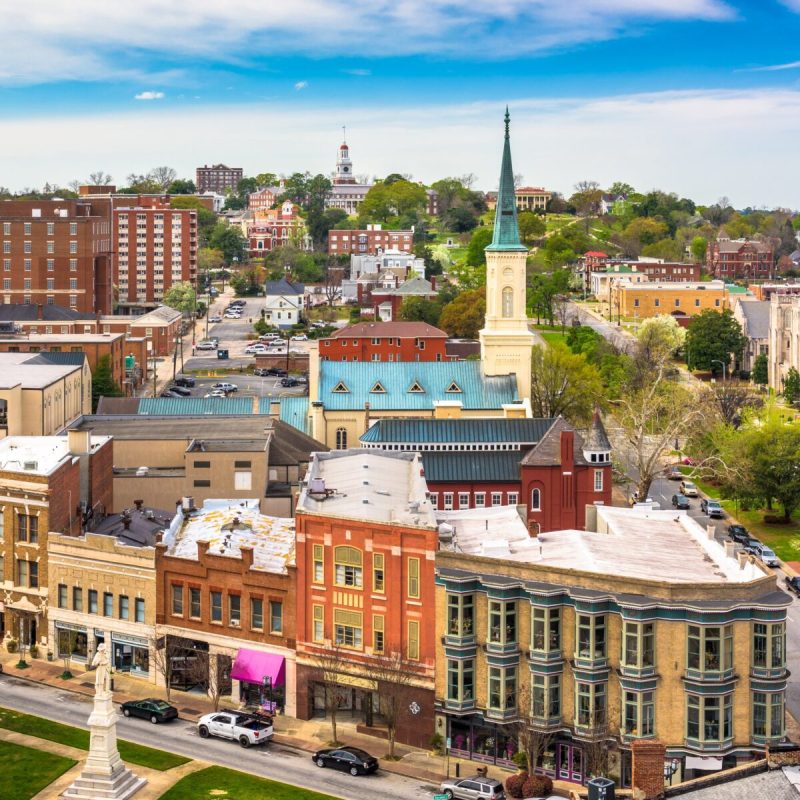
Georgia may have been in the spotlight for politics lately, but there’s so much more to the state than current affairs.
In fact, historic Macon in Bibb County, Georgia, is rich in music lore, outdoor adventure, Civil Rights history, Southern cuisine, and culture.
Established in 1809 by European settlers, the town is named after statesman Nathaniel Macon, and thanks to the Ocmulgee River, the community thrived with trade and industry. It’s also the home of Wesleyan College, Mercer University, and the famous Capricorn Records studio.
In addition to the rich history and hopping downtown Macon, the area is one of the best places in middle Georgia to explore the great outdoors with miles of hiking trails, river access, and agritourism.

During the Civil War, Macon was defended three times before surrendering to the Union forces. The original Southern antebellum homes were saved, and many of Macon’s neighborhoods feature classic Victorian-style homes and Greek Revival homes.
The city is so known for its architecture that it has been called “a textbook of historic architecture,” with 6,000 individual structures in 14 historic districts listed on the National Register of Historic Places. The National Trust for Historic Preservation named this central Georgia community as one of America’s “Dozen Distinctive Destinations.”
Macon, Georgia, also made its mark in America’s musical journey. One of the birthplaces of Soul and Southern Rock, Macon was the childhood home of greats like Little Richard and Otis Redding, and James Brown recorded his first single in town at WIBB in Macon and was inducted into the Georgia Music Hall of Fame Museum (now closed).
Of course, the 1970s put Macon into the spotlight, with Capricorn Records introducing the Allman Brothers Band, Wet Willie, and the Marshall Tucker Band.
Headed to Georgia? Here are seven fantastic things to do in historic Macon, a charming destination in the heart of Middle Georgia.

1. Explore The Great Outdoors
With 180 acres of upland forest at Amerson River Park, you can easily explore high bluffs and beautiful views of the Ocmulgee River on 7 miles of trails that weave through the park. Located just off Interstate 75, it’s an easy way to get in some hiking, canoeing, kayaking, and exploring the wetlands without ever leaving the city.
Macon is a parks city, and its many community parks and walking trails give ample opportunity to experience the area’s natural beauty. Located just outside Macon, Lake Tobesofkee is a popular locals’ favorite recreation area that has three parks, camping, sandy beaches, and 35 miles of shoreline. Lake Tobesofkee also added four new pickleball courts at Sandy Beach, and both Arrowhead Park and Claystone Park have plenty of camping and RV spots.
For a more rustic adventure, the Ocmulgee Outdoor Expeditions is a locally owned canoe and kayak rental service for the Ocmulgee River that has a variety of trips suitable for novice and experienced paddlers alike.
Located in the heart of downtown Macon, the central park called Carolyn Crayton Park connects to the Ocmulgee Heritage Trail, a 13-mile walking trail that weaves through the Jackson Springs Park, Spring Street Landing, the Otis Redding Bridge, and the Ocmulgee Mounds National Historical Park via the Walnut Creek connection, known as the Mike Ford Trail. This downtown Macon park is also a popular spot for tournaments, festivals like the International Cherry Blossom Festival and other special events.
Pro Tip: Locals swear by the farmers markets and craft markets. From local produce to hand-crafted goods, the Macon Farmers Markets in downtown Macon are a fun way to enjoy a balmy day while supporting local businesses.

2. Ocmulgee Mounds National Historical Park
More than a thousand years ago, Georgia was home first to the Paleo-Indians and then to the Mississippian culture of prehistoric Native Americans. Macon is the site of the continent’s only reconstructed Earth Lodge and Early Mississippian temple mounds at the Ocmulgee Mounds National Historical Park.
Visitors can explore the Ocmulgee National Monument and stroll along a wooden boardwalk through the area’s wetlands. Visitors can also enter the Earth Lodge, a reconstructed council chamber of Mississippian culture. Using the original clay floor that dates back to 1015 A.D., the lodge was recreated in the late 1930s by Civilian Conservation Corps and Works Project Administration crews under the direction of Archeologist A.R. Kelly.
Ocmulgee also has 8 miles of trails, and all but two of the 10 different trails are less than a mile long, so it’s appropriate for all levels of walkers.

3. Macon’s Many Museums
If history, art, and culture are more your speed, Macon is chock-full of world-class museums on everything from modern art to baseball.
To honor the Civil Rights Movement and African American heritage, visit the Tubman Museum, the largest museum in the Southeast dedicated to African American art, history, and culture.
Although authentic African art is a highlight, the museum dives deep into contemporary African American art and Southeastern folk art. Learn about the contributions of African Americans in the From the Minds of African Americans gallery, which highlights the inventors, entrepreneurs, and scientists that made their mark on America.
The Museum of Arts and Sciences in downtown Macon is a thorough and entertaining multi-generational museum that offers everything from children’s workshops, bird-watching walks, holiday events like the Festival of Trees exhibit during Christmas, and a stunning planetarium. The Museum of Arts and Sciences’ Discovery House Interactive Museum isn’t just a thrilling learning experience for kids, but for grown-ups who want to discover the mysteries and wonders of the natural world as well.
Visit a seven-story Renaissance Revival mansion built in the 1800s at the Hay House Museum. Called “The Palace of the South,” the house is widely recognized as the most technologically advanced antebellum building in America.
Music fans can’t miss The Allman Brothers Museum at The Big House, which was home to band members from 1970-1973. This museum has the largest collection of the band’s memorabilia in the world. The Otis Redding Foundation also has a “mini-museum” that shares the history and awards of Mr. Redding.
Sports lovers will hit a home run with the Georgia Sports Hall of Fame, a 43,000-square-foot state-of-the-art museum with more than 3,000 artifacts.
4. H And H Soul Food
H and H Soul Food in Macon is one of the South’s most iconic restaurants and a must-do for visitors to the city.
The soul food restaurant was opened in 1959 by Inez Hill and Louise Hudson and became famous for its founders’ tight friendship with the Allman Brothers Band. “Mama” Louise even had her own seat on Allman Brothers’ tour bus in 1972. The restaurant and its founders played a big role in Macon’s Southern rock explosion, making it a favored stop for musical greats passing through Georgia.
After Mama Hill died, the Moonhanger Group reopened the restaurant in 2014 in partnership with Mama Louise.
Pro Tip: Don’t skip breakfast when you have a chance to try the famous H and H waffles or the Mystic Gravy biscuits. For lunch, try the fried green tomatoes and the super-affordable meat plates.

5. Cannonballs, Cemeteries, And Beer
During the Civil War, one of Macon’s historic homes was ravaged by a cannonball. Now named The Cannonball House, the 1853 Greek Revival home features the original furnishings. The cannonball house contains the founders’ furniture for the two oldest sororities in the world, Adelphean and Philomathean.
The house also features a military collection from the Confederacy and a gift shop specializing in Victorian-inspired gift items.
One of the oldest surviving public cemetery parks, the Rose Hill Cemetery, is the final resting place for 600 Confederate soldiers, two founding members of the Allman Brothers Band, three Georgia governors, and an ax-murderer whose inscription only reads “Just a Brown Dog…”
After learning about Macon’s Civil War history, stroll on down to the Macon Beer Company, the city’s only craft brewery, for a little refreshment and maybe an impromptu game of cornhole.
6. Smiley’s Flea Market
Smiley’s Flea Market is Georgia’s largest and finest flea market with over 1,000 selling spaces, and anyone who loves finding treasure can’t miss this experience. In addition to more than 1,000 booths selling everything from antiques to peanuts, this gigantic “garage sale” also has seven restaurants and is open every Saturday and Sunday.

7. Cherry Blossom Festival
If you visit Macon during March and April, you’re in luck. The Cherry Blossom Festival will be in full swing, and you’ll marvel at the more than 350,000 Yoshino cherry trees in full bloom. In fact, Macon has the most Yoshino cherry trees in the world, and the celebration includes live concerts, outdoor arts and crafts booths, a fair, and more.
If you miss the Cherry Blossom Festival, don’t worry. Macon, Georgia is a festival city, so you can find live events and festivals to be a part of every month.
Don’t miss Macon’s Burger Week, the Beefiest week Macon has ever seen. For 7 days in the late summer, Macon celebrates the American classic hamburger with a selection of competitors who hope to be chosen as the best burger.
8. The Macon Music Trail
The Macon Music Trail is a unique tourism opportunity to explore the musical history of this Georgia community. An online resource and directory of Macon’s local music history, the Music Trail explores Macon’s impact on American popular music.
And what a history it is. From Otis Redding to the Allmond Brothers, from African American blues artist Lucille Hegamin to blind Blues guitarist The Reverend Pearly Brown, the musical legacy of Macon can border on overwhelming.
The online Macon Music Trail was designed to make exploring musical history easier through a directory of Macon’s local music history, current scene, and tourism opportunities.
The Grand Opera House, the performing arts center of Mercer University in Macon, Georgia, continues the performance and musical traditions of this Bibb County area with musical performances from the Macon-Mercer Symphony Orchestra, ballet performances, musicals, and more.
Macon is more than just music, too! It’s also the birthplace of esteemed poet Sidney Lanier. This much-loved southern poet is still honored today in central Georgia by Lake Lanier and Georgia’s largest cable-stayed bridge, the Sidney Lanier Bridge, in Brunswick, Georgia.
